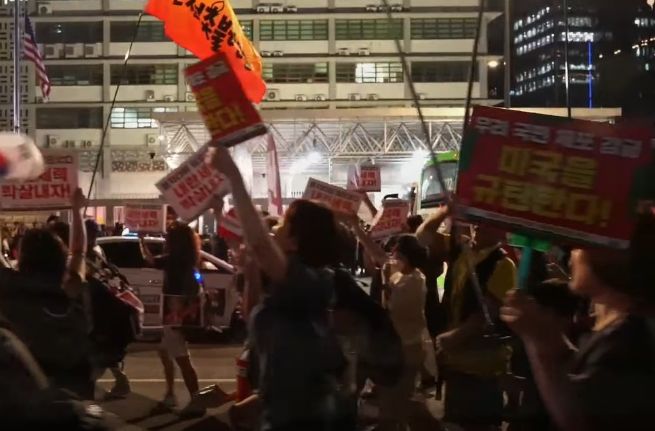
At Gwanghwamun, the progressive group Candlelight Action gathered near the U.S. Embassy, denouncing the incident as a violation of national dignity. (Image courtesy of Candlelight Action)
SEOUL, Sept. 13 (Korea Bizwire) — The sun had just dipped behind the skyline of Gwanghwamun when demonstrators began to gather, clutching banners, candles, and hastily printed placards. By nightfall, the streets outside the U.S. Embassy had become a stage for simmering outrage.
Hundreds marched through central Seoul on Saturday evening, their chants ricocheting off the stone walls of Gwanghwamun Square: “Condemn America for detaining our people!” and “Expel the U.S. ambassador!” Some protesters went further, demanding a direct apology from President Donald Trump.
The rallies followed the mass detention of more than 300 South Korean workers in Georgia earlier this month, an episode that has left Seoul reeling, businesses shaken, and ordinary citizens questioning whether the country’s most important alliance rests on increasingly fragile ground.
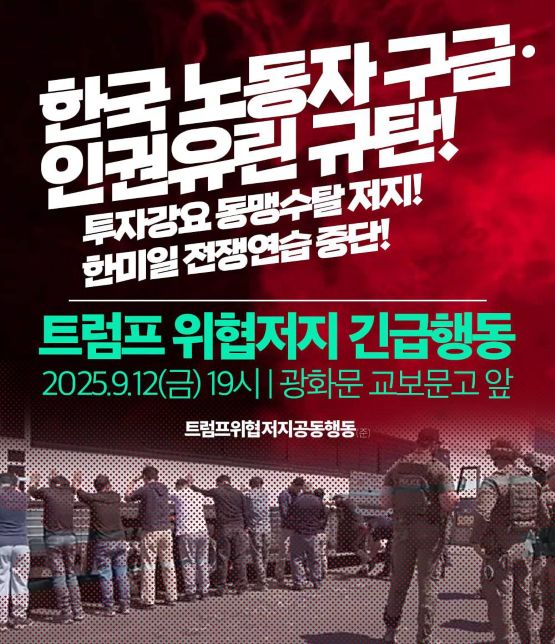
A civic group, calling itself the “Emergency Action to Stop Trump’s Threats,” held a rally condemning the detention of Korean workers and the violation of their human rights. (Image provided by Emergency Action to Stop Trump’s Threats)
Voices of Protest
At the heart of the demonstrations was Candlelight Action, the progressive civic coalition that emerged from past anti-government movements. “The United States is even threatening Korea as though we were the wrongdoer,” said Kim Ji-sun, one of its co-leaders, her voice rising over loudspeakers. “Summoning the ambassador is not enough. We must consider expulsion.”
The march wound through familiar downtown arteries — Gwanghwamun Square, Anguk-dong, Jonggak Station — as onlookers filmed the crowds on their phones. For a brief moment outside the embassy, chants turned personal: “Trump, apologize!”
Earlier in the afternoon, the Korean Confederation of Trade Unions staged its own rally near City Hall. Union leaders accused U.S. immigration officers of “unlawfully abducting” Korean workers and castigated Seoul for failing to stand up forcefully to Washington. They coupled their criticism with a domestic demand: stronger protections for platform workers and subcontractors, whom they argue remain excluded from labor law safeguards.
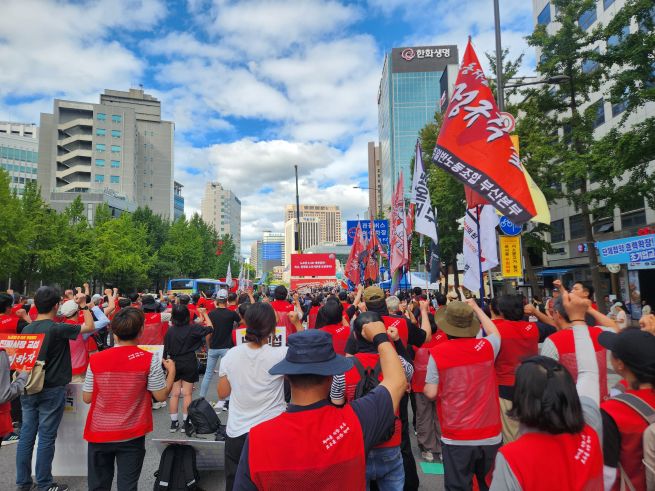
The Korean Confederation of Trade Unions (KCTU) also held a rally near City Hall Station at 3 p.m. on September 13, arguing that “U.S. immigration authorities unlawfully detained large numbers of Korean workers at local factories, while the Korean government, preoccupied with appeasing Washington, failed to properly protect its own people.” (Yonhap)
A Chorus of Different Voices
Not all protests shared the same message. Conservative Christian groups, long wary of President Lee Jae-myung’s government, rallied nearby in Gwanghwamun. Their placards read “Stop persecuting the church” and “Down with Lee Jae-myung’s dictatorship.”
And in the digital realm, the backlash was even more fragmented. Online forums buzzed with talk of boycotting U.S. brands, from Costco to Tesla. One man posted a photograph of his canceled electric-vehicle order, writing, “I was waiting with excitement, but after seeing the images from Georgia, I couldn’t go through with it.”
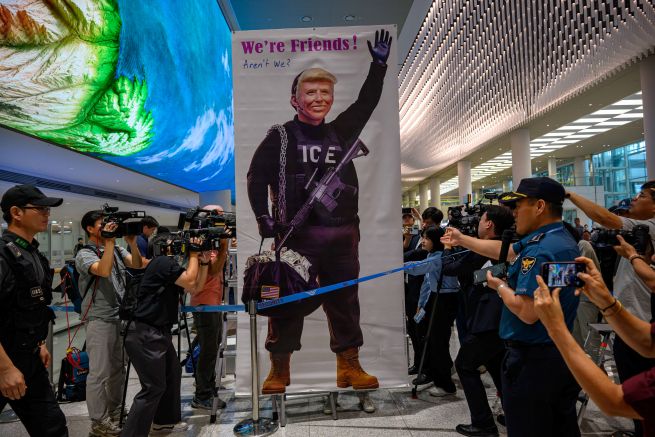
On September 12, at the arrival hall of Terminal 2 at Incheon International Airport, where South Korean workers detained in Georgia by U.S. immigration authorities returned home, Lee Je-seok, head of the Lee Je-seok Advertising Research Institute and widely known as a genius ad planner in Korea, staged a placard performance featuring the image of U.S. President Donald Trump. A recent poll shows that many South Koreans feel not only bewildered but increasingly angry over the incident. (Yonhap)
Political Reverberations
The anger has not remained confined to the streets. Hong Joon-pyo, the former presidential candidate and longtime conservative heavyweight, called the detentions an “intentional provocation” and went further still, reviving a once-taboo idea: nuclear armament. “Even as allies, being treated this way is humiliating,” he wrote on Facebook, likening last month’s U.S.-Korea summit to a feudal tribute ceremony.
Such remarks, while controversial, underscore how the Georgia incident has unsettled the political consensus around the alliance. For decades, the U.S.-Korea partnership has been treated as sacrosanct by successive governments. Now, images of South Korean engineers shackled with metal chains and marched into buses by U.S. agents have reopened questions of sovereignty and respect.
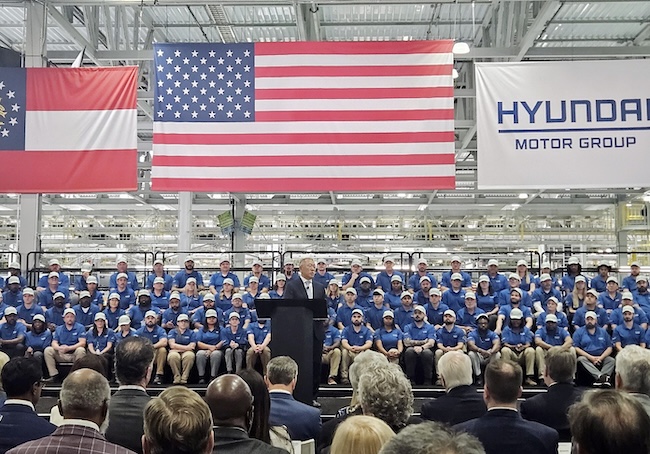
Hyundai Motor Group Executive Chairman Euisun Chung speaks during an opening ceremony of Hyundai Motor Group Metaplant America (HMGMA) in Ellabell, Georgia, on March 26, 2025. (Image courtesy of Yonhap)
Between Outrage and Realpolitik
Analysts note that despite the fury, few expect Seoul to fundamentally alter its ties with Washington. South Korea remains deeply invested in U.S. supply chains for semiconductors, batteries, and shipbuilding — the very industries that prompted the workers’ presence in Georgia in the first place.
But for many on the streets of Seoul, the issue is not policy but pride. “This is not about economics,” said one middle-aged protester in Gwanghwamun, waving a small Korean flag. “It is about dignity. Our people were treated like criminals.”
Whether the weekend’s protests will fizzle or snowball into a larger movement remains to be seen. But the Georgia detentions — an episode that began in a factory construction site thousands of miles away — have reverberated across the Pacific, leaving scars that neither diplomacy nor fast-tracked visas will quickly erase.
M. H. Lee (mhlee@koreabizwire.com)
